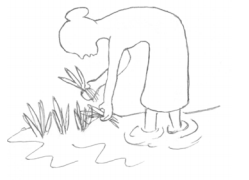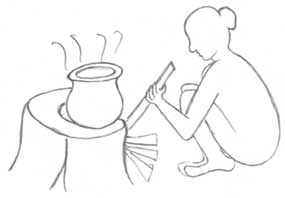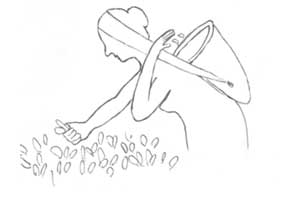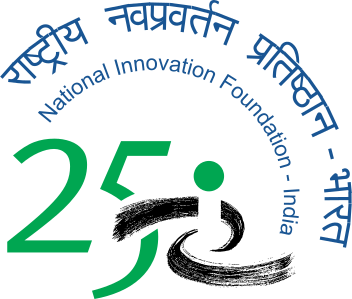Gandhian Inclusive Innovation Challenge Awards 2015
National Innovation Foundation - India (NIF) announces the Gandhian Inclusive Innovation Challenge Awards 2015. Innovators in informal and formal sector may offer the design and development solutions to the following three challenges concerned with the drudgery that the resource poor women of country have.
Challenge 1: Developing a manual paddy transplanter
Millions of women have to bend their backs for hours standing naked feet in the water to transplant paddy in the fields. The challenge is to develop a manual paddy transplanter, which should
- Be easy to operate, clean and maintain
- Light in weight so that it can be carried easily
- Be atleast three times in capacity (output: area transplanted/unit time) as compared to human effort
- Be able to be used in different kinds of soils and across different agroclimatic regions of the country with minor modifications to suit local needs
- Be cost effective so that small and marginal farmers may afford it
- Be useful for small land holdings and may be scaled up for larger farms
- The construction materials should be such which are easily available across the country
Challenge 2: Developing a fuel efficient wood/bio mass stove
The challenge is to develop a stove, which could satisfy the following conditions
- Fuel efficient with efficiency greater than 50 % at least
- Able to use different kinds of fuel woods, bio mass available/used in different parts of the country
- Low in smoke/emissions
- Can be made/assembled easily using locally available materials (throughout the country)
- Should be compact so that a small household can also use it
- Cost effective
Challenge 3: Developing a tea plucking device
Women comprise over fifty percent of the total work force in tea gardens in India. Plucking of tea leaves manually involves a lot of drudgery. The challenge is to develop a tea leaf plucking device, which satisfies the following conditions
- Ergonomic, manual/semi-automatic so that the labour does not get replaced and mainly the drudgery is reduced
- Be easy to operate, clean and maintain
- Less in weight so that it can be used easily, tea collection bag may also be incorporated in the same so that women do not need to carry it on their back
- Be atleast three times in capacity (output: tea leaves plucked/unit time) as compared to human effort
- The construction materials should be such which are easily available across the country
- Provision of height adjustment should be there
- Should be able to move easily between the rows of tea plants
- Cost effective so that it is not a burden for tea plantation owners or welfare committees to purchase them
Prize Money : (For each challenge)
First Prize : Rs 10, 00, 000 (Rs Ten Lakh only)Second Prize : Rs 5, 00, 000 (Rs Five Lakh only)Third Prize : Rs 2, 50, 000 (Rs Two Lakh Fifty Thousand only)
Important terms and conditions
- The members of National Innovation Foundation – India or its associates including members of GIANs, and their family members are not eligible to participate in the competition.
- Any other person, irrespective of his/her occupation and educational background including scientists, designers, engineers, innovators can participate in the competition.
- Any person or team (each member should have significant contribution) can submit their entries for any or all of the above three challenges.
- More than one entry may be submitted for any or all of the above three challenges.
- A functional working model would be required for final consideration for awards. No financial support for the same would be provided by NIF. However, in deserving cases of grassroots innovators from the informal sector such as self-employed individuals, farmers,mechanic, students (upto class 12), etc., financial support may be provided if the synopticdesign submitted by him/them has been accepted by NIF. The decision to provide such a support rests with NIF and its decision would be final.
- All designs submitted in any or all of the categories would become property of NIF. It would have the right to use the same as it is or combine features with other designs to develop prototypes, which may be used for the service of society at large later.
- The prototypes submitted would be put to standard tests for efficiency, emissions, and other mandatory tests at appropriate laboratories and/or be given to actual users.Participants may also get their prototypes evaluated on their own and send us the reports/feedback of actual users in support of their submissions.
- The Award Committee would look into the features and reports and make a decision.
- The decision of the Award Committee would be final and not correspondence in this regard would be entertained by NIF. The awards would be declared on a date to be announced later.
- The designs can be submitted on or before 31st December, 2015.
- The entries may be sent to the following address
Gandhian Inclusive Innovation Challenge Awards 2015
National Innovation Foundation - India
Satellite Complex, Premchand Nagar Road,
Ahmedabad 380 015, Gujarat
Phone: (079) 26732456, 26732095, Fax: (079) 26731903
sd@nifindia.org, Website: www.nif.org.in






